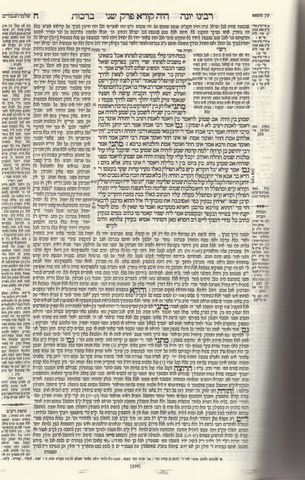
HIDE/SHOW IMAGE
8a
[do not read bameh - how little - but rather] bama - private altar {literally high place}.
And these words are only when you {go out of your way to} go early to his door, but if you do not go early to his door, it is permitted.
For we learned, in the breaks he may ask because of honor and reply to any man. {And the Shema is before the prayer, that is Shemoneh Esrei.}
Rav Yitzchak bar Ashian said: it is fobidden for a man to go on the road before he has prayed, as it states in Tehillim 85:14:
| יד צֶדֶק, לְפָנָיו יְהַלֵּךְ; וְיָשֵׂם לְדֶרֶךְ פְּעָמָיו. | 14 Righteousness shall go before Him, and shall make His footsteps a way. {P} |
Rav Iddi bar Avin said: One who prays and afterwards sets out on the road, Hashem provides for his needs, as it states in Tehillim 85:14:
| יד צֶדֶק, לְפָנָיו יְהַלֵּךְ; וְיָשֵׂם לְדֶרֶךְ פְּעָמָיו. | 14 Righteousness shall go before Him, and shall make His footsteps a way. {P} |
MISHNA:
THE BREAKS ARE AS FOLLOWS:
BETWEEN THE FIRST BLESSING AND THE SECOND
BETWEEN THE SECOND AND Shema {='HEAR',}
BETWEEN Shema AND VeHaya Im Shamo'a {='AND IT SHALL COME TO PASS'}
BETWEEN VeHaya Im Shamo'a AND Vayomer {='THE LORD SAID'} AND
BETWEEN Vayomer AND Emet VeYatziv { 'TRUE AND FIRM'}
RABBI JUDAH SAYS: BETWEEN Vayomer AND Emet VeYatziv ONE SHOULD NOT INTERRUPT.
Gemara:
Rabbi Abahu cited Rabbi Yochanan: the halacha is like Rabbi Yehuda {that you should not interrupt between Vayomer and Emet VeYatziv}.
And Rabbi Abahu cited Rabbi Yochanan: What is Rabbi Yehuda's reason? For it states in Yirmiyahu 10:
Vayomer is Elokeichem, we juxtapose the chapter that begins `emet.}
Does he repeat `emet {because it is now the last word of Vayomer and the first word of `emet}?
Rabbi Yochanan said he repeats `emet.
And Rava said he does not repeat `emet.
And the halacha is like Rava.
MISHNA:
Rabbi Yehoshua ben Korcha said: Why does {the chapter of} Shema precede VeHaya Im Shamo'a? In order that he first accpets upon himself the yoke of the kingship of Heaven, and afterwards accepts upon himself the yoke of the commandments. VeHaya Im Shamo'a precedes Vayomer because VeHaya Im Shamo'a is practiced whether during day or night, while Vayomer is only practiced at night {since it mentions tzitzit}.
Ulla said: One who reads Shema without wearing tefillin is as if he testified false testimony about himself.
Rabbi CHiyya bar Abba cited Rabbi Yochanan: it is as if he brought a todah {thanksgiving offering} with no mincha {meal offering} and a zevach {sacrifice} without libations.
And Rabbi Yochanan said: One who wishes to accept upon himself the yoke of the kingship of Heaven completely, {Brachot 15a} should go to the bathroom, wash his hands, put on tefillin, read Shema, and pray, and this is the complete yoke of the kingship of Heaven.
And anyone who goes to the bathroom, washes his hands, puts on tefillin, reads Shema, and prays, the Scripture considers it as if he has built an altar {in a good way -- mizbeach} and sacrificed upon it a sacrifice, as it states in Tehillim 26:6:
| ו אֶרְחַץ בְּנִקָּיוֹן כַּפָּי; וַאֲסֹבְבָה אֶת-מִזְבַּחֲךָ ה. | 6 I will wash my hands in innocency; so will I compass Thine altar, O LORD, |
He {Rava} said: He says well. Does it (the pasuk in Tehillim 26:6) say beMayim - with water? It says בְּנִקָּיוֹן - in cleanliness. Any substance which cleans.
Rav Chisda would curse anyone who looked after water at the time of prayer.
And these words are in terms of reading Shema



No comments:
Post a Comment